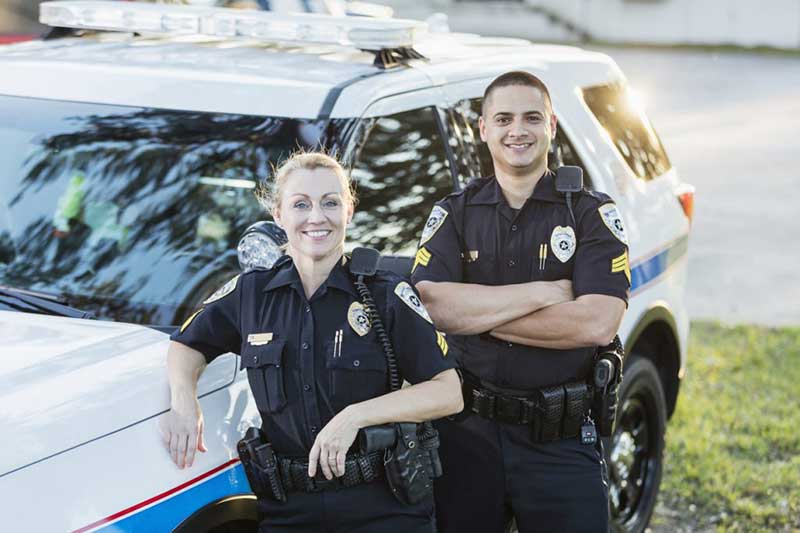Do you want to make the world a better place? Are you looking for a career that allows you to stand up for justice and protect those who are most vulnerable? If so, you may be interested in a career within the criminal justice field. Criminal justice roles allow you to make the world a safer and better place for the citizens of your community. Are you a problem solver and peacekeeper dedicated to a high level of integrity and abide by an ethical code? If you are interested in pursuing a career in criminal justice, keep reading to learn what it takes to enter this highly rewarding and exciting career field.
Why Work in Criminal Justice?
The field of criminal justice covers many different positions and roles. Regardless of what position you may find yourself in, you’ll usually find some commonalities between yourself and other criminal justice graduates. Most people who enter these careers are passionate about helping others, especially those most vulnerable within their communities. They stand up and fight for justice and help to ensure that those who break the law make up for their crimes by penalty, restitution, or time served in a correctional facility.
Criminal Justice Careers and Job Outlook
While the career fields within criminal justice are wide and varied, they are all projected to increase in demand over the next several decades, according to the U.S. Bureau of Labor Statistics. Crime never takes a day off, so you are in higher demand. A criminal justice diploma can ensure job stability, financial independence, and a fulfilling career. By pursuing a diploma in criminal justice, you can rest assured that you will always have a safe place in your local community.
What Kind of Job Can I Get with a Criminal Justice Diploma?
There are many different types of positions you can pursue with a criminal justice diploma. Following are just a few of the many positions you can attain with this diploma, along with a description of the duties you can expect within each job title.
1. Corrections Officer
A corrections officer’s main role is to keep upstanding citizens safe and maintain security within correctional settings. Corrections officers oversee the care of those in custody and awaiting trial and those convicted and sentenced to serve time.
Not only are correctional officers tasked with keeping the public safe from offenders, but they must also keep the inmates safe. Correctional officers ensure that the day-to-day operations of the correctional facility are well maintained while providing inmates with access to medical care, food, and other rights as provided under the Eighth Amendment.
2. Juvenile Justice Corrections Officer
Juvenile justice corrections officers are tasked with many of the same roles as adult corrections officers. However, there are notable differences. Juveniles who break the law and are found guilty of committing an offense are housed separately from adults. Juvenile justice correctional facilities are secured just like adult facilities. However, there is a larger focus on rehabilitating the young offender.
Juveniles are not legally considered adults. Therefore, they may have more rights that must be attended to and ensured by correctional officers.
Juvenile justice correctional officers ensure that youthful offenders receive educational opportunities within the facility while serving their sentence. Juvenile justice corrections officers help to maintain the facility’s operational efficiency and security.
3. Local, State & Federal Patrol Officer
Patrol officers can be employed locally, state, or federal. The amount of jurisdiction they have is dependent on which level they are employed at. For example, local patrol officers are assigned to a particular city or county. State patrol officers can be assigned statewide or within a geographical location.
Patrol officers who work on a federal level may be assigned to particular federal buildings or areas. A patrol officer’s duties are maintaining civil order and keeping the peace within an area or community. They proactively watch for potential criminal activity and detain or arrest people breaking the law. Patrol officers may also be assigned to traffic duty.
4. Private & Corporate Security
Many businesses and private companies hire security details for several reasons. Security guards are tasked with keeping the property safe and ensuring the safety of people working within the company’s buildings. They patrol the grounds and watch for suspicious activity or people who do not have clearance to enter the building.
They monitor surveillance equipment to maintain safety within the perimeters. They are also tasked with guarding all entry points around the building and verifying the identities and credentials of those who enter. There are usually several security guards on detail who may work in shifts to maintain high levels of vigilance and prevent fatigue.
5. Homeland Security Analyst
In this day and age, homeland security analysts are more important than ever. They keep watch over the security of the nation. They monitor threats and investigate tips for potential criminal activity. Homeland security analysts may gain access to criminal groups through undercover operations to prevent an attack against citizens and institutions. They are responsible for preventing the smuggling of illegal substances into the country. Homeland security analysts also identify and prevent groups and gangs from conducting human smuggling and other federal crimes.
How Do You Get a Diploma in Criminal Justice?
You can receive a diploma in criminal justice by attending in a vocational college. Whether you want to work as a corrections officer, patrol officer or in one of the other criminal justice roles, you will learn a complete curriculum of criminal justice to find a rewarding role within your community.
What are the Benefits of a Vocational College Diploma?
There are many benefits to getting a criminal justice diploma. The following are some of the reasons why you should first obtain a diploma before seeking employment in the criminal justice field.
Enjoy a Competitive Advantage in the Industry
Job candidates who have received a diploma in criminal justice prior to applying for a position are much more likely to picked for interviews. By receiving a diploma in criminal justice, you will be demonstrating your dedication towards this role. Your diploma will also demonstrate your ability to follow through and confirm your level of commitment, which will make you a much more attractive job candidate.
Start Your Career in as little as Nine Months
You can receive your diploma in criminal justice within nine months, which means you can start your career and start earning right away. And, if you want to progress to a degree in criminal justice and open up more opportunities, you can attend school for an additional six months.
Industry Experienced Instructors
Instructors in a criminal justice program have a lot of industry experience. Many areas of law enforcement and criminal justice have been completely transformed due to technological advances and improvements of the criminal justice system. You will receive invaluable knowledge from your instructors and get guidance on how to handle different situations which may arise throughout your criminal justice career.
Get Hired Quickly with Access to Career Services
Many people have a difficult time finding the perfect job for their skillset. This is even more of an issue for those who haven’t attended a formal education. By pursuing your criminal justice diploma, you will have access to career services. Career services will help you create a professional looking resume, show you how to prepare for your job interview, and give you vital assistance on finding job leads so you can start the job of your dreams
Network and Maintain Valuable Connections with Your Peers
While working towards your criminal justice diploma you’ll meet many new people from all walks of life. You’ll have the opportunity to network and make valuable connections with your peers. You’ll enjoy the opportunity to meet like-minded people who all share a passion for criminal justice.
Final Thoughts
Earning your diploma in criminal justice is one of the best ways to discover great opportunities within this exciting career field. A criminal justice diploma is not only extremely versatile, but it also prepares you for opportunities including law enforcement, corrections, forensics, and national security. Take the first step towards your successful future by earning your criminal justice diploma today.
Want to Learn More?
Our mission at ATA College is to provide diploma and associate degree training for entry-level positions in specialized fields. Our goal is to assist you in learning new skills and enhancing previously obtained skills through higher education. We strive to fulfill your needs in seeking employment in our community. We are committed to providing a quality education that instills core values that will develop work ethics, professionalism, honor, and integrity, giving you a competitive edge through any economic condition.
Criminal Justice & Public Safety Diploma
After completing the 9-month diploma program at our criminal justice school, students can continue with courses in the Associate of Science program. The criminal justice associate degree is available in multiple emphasis pathways and can be completed in an additional six months after general education courses. Contact us today to learn more about criminal justice career opportunities offered at ATA College.





